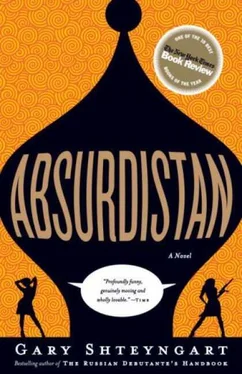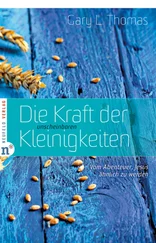“That’s the best kind of Jew there is,” Papa said. “All he does is learn and pray all day.”
“Why don’t you become a Hasid, then?” I asked him.
“I have to work hard now,” Papa said. “The more money I make, the more I can be sure no one will ever hurt you. You’re my whole life, you know? Without you, I would cut my throat from one ear to the other. And all I ask you to do, Mishka, is get snipped by these Hasids. Don’t you want to please me? I loved you so much when you were small and thin…”
I recalled how my little body felt when encased in his, his wise brown eagle eyes eating me up, the worsted bristles of his mustache giving my cheeks a manly rash I would treasure for days. Some wags say that men spend their entire lives trying to return to their mother’s womb, but I am not one of those men. The trickle of Papa’s deep vodka breath against my neck, the hairy obstinate arms pressing me into his carpet-thick chest, the animal smells of survival and decay— this is my womb.
* * *
Several months later, I found myself in a livery cab, roaring through a terrifying Brooklyn neighborhood. In the Soviet Union, we were told that people of African descent—Negroes and Negresses, as we called them—were our brothers and sisters, but to the newly arriving Soviet Jews at the time, they were as frightening as armies of Cossacks billowing across the plains. I, however, fell in love with these colorful people at first blush. There was something blighted, equivocal, and downright Soviet about the sight of underemployed men and women arranged along endless stretches of broken porch-front and unmowed lawn—it seemed that, like my Soviet compatriots, they were making an entire lifestyle out of their defeat. The Oblomov inside me has always been fascinated by people who are just about ready to give up on life, and in 1990, Brooklyn was an Oblomovian paradise. Not to mention the fact that some of the young girls, already as tall and thick as baobab trees, their breasts perfectly shaped gourds that they regally carried down the street, were the most beautiful creatures I’d seen in my life.
Gradually, the African neighborhood gave way to a Spanish-speaking section, equally disheveled but pleasantly coated with the smell of roasted garlic, and that in turn gave way to a promised land of my Jewish co-religionists—men bustling around with entire squirrels’ nests on their heads, side curls flapping in the early-summer wind, velvety coats that harbored a precious summer stink. I counted six tiny boys, probably between three and eight years of age, their blond untrimmed locks making them look like infant rock stars, running around a deeply tired penguin of a woman as she pattered down the street behind a scrim of grocery bags. What the hell kind of Jewish woman has six children? In Russia, you had one, two, maybe three if you didn’t care for constant abortions and were very very promiscuous.
The cab stopped in front of an old but grand house whose bulk was noticeably sinking into its front columns the way an elderly fellow sinks into his walker. A pleasant young Hasid with an intelligent expression (I’m partial to anyone who looks half blind) welcomed me in with a handshake and, upon ascertaining that I spoke neither Hebrew nor Yiddish, began to explain to me the concept of a mitzvah, meaning “a good deed.” Apparently I was about to perform a very important mitzvah. “I sure hope so, mister,” I said in my burgeoning but imperfect English. “Because pain of dick-cutting must be intolerable.”
“It’s not so bad,” my new friend said. “And you’re so big, you won’t even notice it!” Upon seeing my still-frightened expression, he said, “They’ll put you under for the surgery, anyway.”
“Under?” I said. “Under where ? Oh, no, mister. I must go back to my hotel room immediately.”
“Come, come, come,” said the Hasid, adjusting his thick glasses with a worn-out index finger. “I’ve got something I know you’re going to like.”
I followed him into the bowels of his house with my head hung low. After the typical drabness of the one-room Soviet apartment with the bulbous refrigerator shuddering in the corner like an ICBM before launch, I found the Hasidic home to be a veritable explosion of color and light, especially the framed plastic pictures of Jerusalem’s golden Dome of the Rock and the crushed blue pillows embroidered with cooing doves. (Later, at Accidental College, I was taught to look down on these things.) Everywhere there were books in Hebrew with beautiful golden spines, which I erroneously imagined to be translations of Chekhov and Mandelstam. The smell of buckwheat kasha and used underwear proved homey and inviting. As we progressed from the front of the house to the back, little boys ran between the tree stumps of my legs, and a young chesty woman with her head wrapped in a handkerchief popped out of a bathroom. I tried to shake her wet hand, but she ran away screaming. It was all very interesting, and I almost forgot the painful reason behind my visit.
Then I heard a low, guttural hum, like the sound of a hundred octogenarians brooding at once. The hum gradually resolved itself into a chorus of male voices singing what sounded like: “A humus tov, a tsimmus tov, a mazel tov, a tsimmus tov, a humus tov, a mazel tov, a humus tov, a tsimmus tov, hey hey, Yisroel. ” Several terms I recognized: mazel tov is a form of congratulation, tsimmus is a dish of sugary crushed carrots, and Yisroel is a small, heavily Jewish country on the Mediterranean coast. What all these words were doing together, I couldn’t begin to fathom. (Later, in fact, I found out those weren’t the words to the song at all.)
Ducking beneath a low frame, we entered the house’s back annex, which was filled with young fedora-wearing men hoisting plastic cups along with slices of rye bread and pickles. I was speedily given one such cup, slapped on the back, told mazel tov!, then pointed toward an old bathtub reclining in the middle of the room on two sets of clawed feet. “What’s this?” I asked my new friend in the thick glasses.
“A tsimmus tov, a mazel tov, ” he sang, urging me forward.
Vodka does not have a smell, but it didn’t take long for an eighteen-year-old Russian to register that the bathtub was indeed filled with that substance, along with floating bits of onion. “ Now do you feel at home?” the happy Hasids shouted to me as I swigged from the plastic cup and chased the drink with a sour pickle. “A tsimmus tov, a humus tov, ” they sang, the men branching their arms and kicking up their feet, their remarkably blue eyes drunkenly ablaze from behind their black getups.
“Your father told us you might need to drink some vodka before the bris, ” the lead Hasid explained. “So we decided to have a party.”
“Party? Where are the girls?” I asked. My first American joke.
The Hasids laughed nervously. “Here’s to your mitzvah !” one of them shouted. “Today you will enter a covenant with Hashem. ”
“What is that?” I asked.
“God,” they whispered.
I drank several cups’ worth, marveling at how the onion helped improve the mixture, and yet the idea of entering into a covenant with God did not go down as easily as the 80-proof swill. What did God have to do with it? I just wanted my father to love me. “Maybe you should take me to hotel, mister,” I stammered. “I give you seventeen dollars in my pocket. Please tell my papa I got cut already. He never look down there anymore, because now I am so fat.”
The Hasids were not buying my suggestion. “You have to think of us, too,” they chanted. “This is a mitzvah for us.”
Читать дальше












